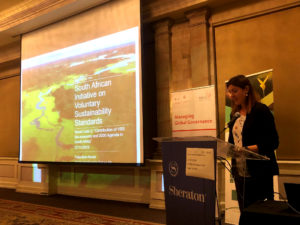
Voluntary sustainability standards (VSS) encompass more than 500 ecolabels that are used in 199 countries involving US$ 50 billion total value. In November, the Managing Global Governance (MGG) Programme of the German Development Institute / Deutsches Institut für Entwicklungspolitik (DIE) co-organised Stakeholder Awareness Meeting: South African Initiative on Voluntary Sustainability Standards in Pretoria, South Africa.
More than 70 representatives from the public sector as well as from research, civil society and business/industry attended the event. The goals of the meeting were to promote public awareness in South Africa on the potentials of VSS, engage and empower multiple stakeholders to support the implementation of the Sustainable Development Goals (SDGs) as well as to initiate the momentum to establish a national framework such as a National Platform on VSS in South Africa.
VSS are an instrument to achieve sustainable development goals, and they are also additional opportunities for business and industry. These standards are significant for businesses exporting abroad, as well as for Micro-, Small-, and Medium-size Enterprises (MSMEs) seeking to optimise their business operations, thus, reducing costs through efficiency.
Using innovative formats such as one-to-one interviews, world cafe and fish bowl, the DIE co-organised stakeholder meeting provided space for exchange among experts from both South Africa and from other countries with emerging economies such as Brazil, India, Colombia, and Vietnam, which already have a national platform on VSS.
The insights gathered at the meeting were collected and will be evaluated in a report that will be published and shared to all stakeholders. You can also follow the debates under the hashtag #VSSforBioeconomyZA on Twitter. For further information please contact Ariel Hernandez.
